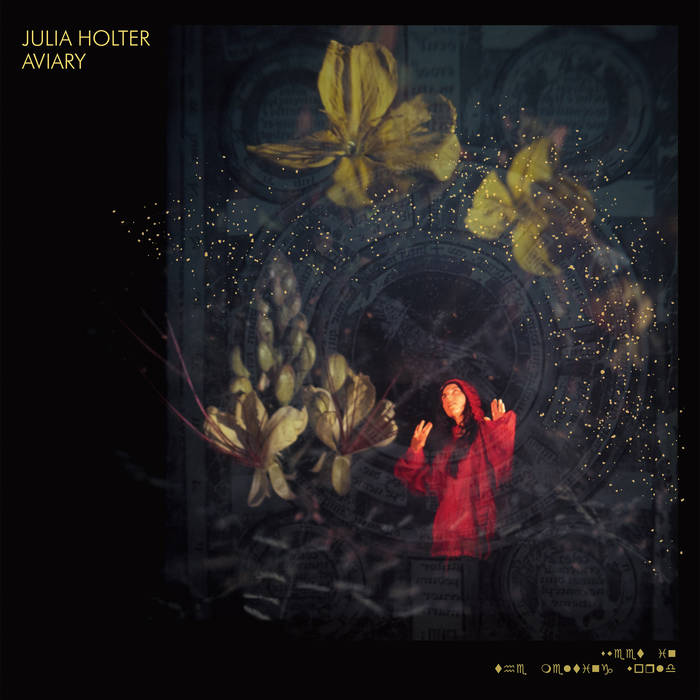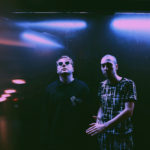As Halloween approaches, surely one the best horror films to include in the scare ride schedule is Alfred Hitchcock’s The Birds, a thriller showing violent feathered creatures mercilessly attacking California. Californian Julia Holter’s new record Aviary might not be specifically inspired by the 1963 classic but it’s influenced by the chaotic flutter and two-faced nature of these airborne animals and what they can represent. Julia Holter uses birds as a metaphor for flocks of memories – they can sometimes be beautiful and sometimes raucous – but are regularly overwhelming and persistently stalking and swarming around the mind, affecting the turbulent nature of modern day life.
“I found myself in an aviary full of shrieking birds“, is a line from Lebanese-American poet Etel Adnan that gave Holter’s fifth album Aviary its title. The music production here also feels inspired by the scattered, chaotic and overpowering nature of birds, even straight from the beginning with the striking, rumbling and suffocating string piece ‘Turn The Light On’.
This track and a lot of the record uses a technique called hocketing in which voices and instruments interrupt each other and create fragmented pieces that can be a challenge to listen to but rewarding if experienced in the right way. ‘Chaitius’ and ‘Everyday Is An Emergency’ are two hocketing tracks that are complete opposites in how they sound like they represent the movement of birds. While the latter ‘Everyday Is An Emergency’ is a discordant, shrieking and uncompromising bagpipe frenzy that could easily soundtrack the terrifying moments in Hitchcock’s aforementioned horror, the former ‘Chaitius’ imagines angelic doves gracefully passing each other with ease, Holter’s choral voices multiplied beautifully over mystical harpischord and lines such as: “Open my wings with joy.”
That track, like many others, is reminiscent of spiritual music from the Middle Ages. Recently Holter became fascinated with this age of history and its messages about the end of the world – note her parents are both historians. From the lyrics it really feels like she is a time-traveller venturing into many pasts, though with no set epoch. This is firstly conveyed when she sings on ‘Voce Simul’: “I always find myself dead, from a fourteenth century. How did I forget I’m part of the dust?” after voicing the ambiguous latin words “Voce simul consona obviosa” (with a loud voice). While on ‘Colligere’ she references both her ongoing bird metaphor for memory and her eagerness to collect poetic texts from the past: “Aviary of my early mind. What I gather is a lot of wings I gathered. What I didn’t know is how so bright“.
Furthermore, she exists in a time of a plague on the quirky ‘Les Jeux to You’: “Can’t you play along? Know the bubonic in the ice / What vulgar Latin is spoken with shame. All these laws here. So undernourished in the dark” and reports an ancient royal time on the hypnotic ‘Words I Heard’: “Ancient king deflecting blame. I love you in the City of Man.” She specifically channels from Ancient Greece on ‘I Would Rather Sea.’ It’s a song featuring Anne Carson’s translation of a poem by Sappho – the first female writer known to Western Civilisation – and has lines such as: “And under the bridges. Her chariots. Shouting Lydians and ranks of foot soldiers.”
The third inspiration other than birds and historical texts was Vangelis‘s beautiful Blade Runner soundtrack, not just for its grandiose electronic scopes but also in its quiet and reflective atmospheric moments, as well as its messages on humanity. The tracks where you can hear this influence most are on the sparkling lights on ‘Colligere’ – one of many tracks where Holter sings in an unusual inventive disjointed manner – the calming saxophone on ‘Voce Simul’ and the erupting futuristic synthesizers on ‘Another Dream’.
Just like birds, Aviary is both beautiful and raucous. It replaces the need for rhythms, choruses and memorable hooks with spacious and unpredictable sonic experimentation and it’s not an easy listen. It requires deep concentration and patience when listening to its lengthy quiet pauses and suddenly dramatic uncomfortable moments, in a similar way to Björk‘s experimental 2004 record Medúlla. Yet experienced in the right atmosphere and mindset it’s a rewarding, dazzling and praiseworthy addition to Holter’s consistently intelligent catalogue.
In the end this isn’t an album that’s been made to please fans or critics. She sings in the record’s best track, the crescendo avalanche ‘I Shall Love 2‘: “Who cares what people say?“




